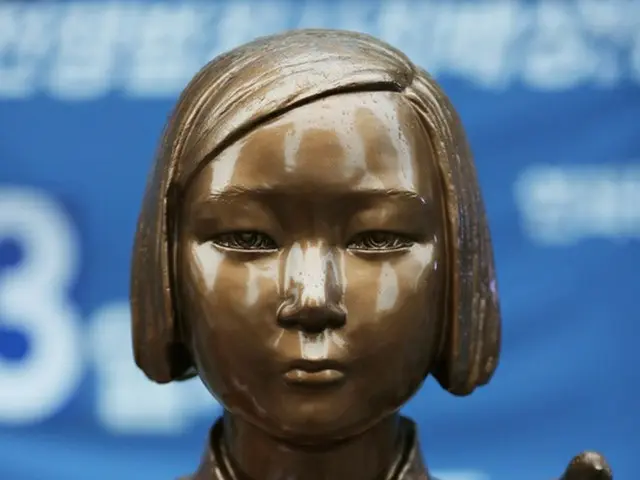According to South Korean media, the authorities have also decided to suspend the budget support they have been providing to the group. The South Korean newspaper Hankyoreh criticized this move as "erasing comfort women," and published an article entitled "Comfort Women:
"The Japanese government's offensive to halt various projects undertaken by Korean and German civil society groups to convey the truth about the issue is having an effect, one by one."
The statue of a girl in the Mitte district was erected in September 2020 by the Korean Council, a German civic group for Koreans. Similar statues are also being erected in the comfort women support movement.
There are statues of girls installed by groups all over the world, and there were already two in Germany before the Council installed the statue. Both were installed on private property, but the Council's statue is the first to be installed on public land.
The statue's placement in a place that caused controversy has included the inscription, which states, "The Japanese military forcibly took countless girls and women from the Asia-Pacific region and made them into sex slaves," a statement that contradicts the facts.
The statue was erected in front of the Japanese Embassy in Seoul in December 2011 by the Korean civic group "Council for Justice and Remembrance for the Issue of Japanese Military Sexual Slavery by the Japanese Army" (Korean Council), which supports former comfort women.
However, in the 2015 Japan-Korea agreement that confirmed the "final and irreversible resolution" of the comfort women issue, the two countries promised to refrain from condemnation or criticism in the international community.
As the installation of comfort women statues in the three countries is incompatible with this position, the Japanese government is calling on each country to remove the comfort women statues as soon as possible. The Japanese government is also lobbying the German side to remove the statue installed in the Mitte district.
In October 2020, the mayor of Mitte issued an order to remove the statue. In response, the council said, "This statue is based on the theme of sexual violence against women during wartime, and is not focused on Japan.
In the end, the mayor withdrew the order to remove the statue, and the ward extended the deadline for the statue to remain in place until September 28, 2022. After that, the statue was allowed to remain in place at the ward's discretion without any legal basis.
At the Japan-Germany summit held in April 2022, Prime Minister Fumio Kishida asked German Chancellor Olaf Scholz for cooperation in the removal.
This was an unusual move. However, the background to this was the Japanese government's sense of crisis that if the erection of the statue was allowed in Germany, a major European country, a false historical message could take root in the international community.
However, since the statue is under the jurisdiction of the Mitte district and the German government has little room to intervene, Chancellor Olaf Scholz's response at the time was apparently lukewarm.
The statue has remained in place to this day, but when Berlin Mayor Wegner met with Foreign Minister Yoko Kamikawa in May of this year, he said, "It is the statue that will bring about change.
"It is important," he said, indicating his intention to seek a solution. The council responded by saying that this was a move toward removal, and that "they have succumbed to pressure from the Japanese government."
And last month, the Mitte district of Berlin announced that it would stop accepting girls from installing the cameras after September 28th of this year, when the deadline for approval of their installation expires.
The city announced its intention to ask the council to remove the statue. Korean media reported that the statue was in danger of being removed. The city also said it would not support the comfort women education program that the council had applied for.
In April of this year, the city denied permission for the construction of the building. According to a report by the Korean media Hankyoreh citing a German public broadcasting station, the decision to deny permission was influenced by the city's mayor, Wegener.
According to reports, the mayor told the members of the advisory committee that will make the final decision on whether to support the city's programs that he would reject the council's application because "there is a risk of conflict with the Japanese government."
In an editorial dated the 5th, the Hankyoreh said, "The Japanese government is pressuring German municipalities to deny permission to send documents to local municipalities that are trying to convey the truth about the comfort women issue."
The South Korean government had long opposed the designation of the Sado Island Gold Mine in Sado City, Niigata Prefecture, as a World Cultural Heritage site, but last month at the last minute it decided to accept it.
Regarding the registration, the Yoon Seok-yeol administration, which caused a major diplomatic disaster with the Sado mine, only took issue with the issue of comfort women, a cruel war crime inflicted on women during the war.
"We must take a clear stand against Japan."
2024/08/08 14:43 KST
Copyrights(C)wowkorea.jp 5

